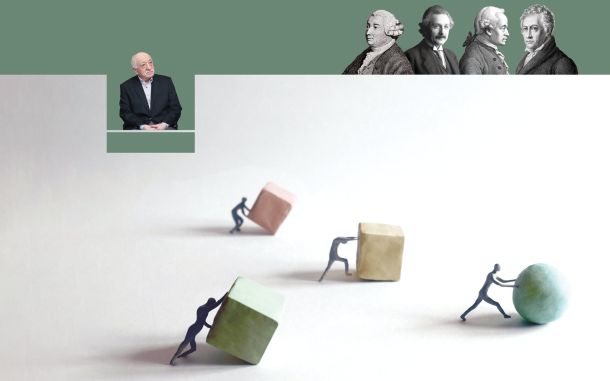Globalization, Identity, and Inclusivity

It was believed that globalization would lead to the diminishing of cultural differences, dilute individual and group identities, and suppress nationalist sentiments. The expectation was that as the world turned into a global village, enhanced communication and transportation, coupled with the rise of pluralistic views, would erase the distinct cultural symbols, traditions, and practices of different societies. There was even speculation that people’s connections to their religions, traditions, customs, and practices would weaken. The concept of global citizenship began to be discussed. However, these forecasts did not materialize as expected. Not only did differences persist, but tolerance for them did not increase. Instead, issues such as racism, xenophobia, bigotry, and other forms of discrimination intensified. This escalation was largely due to the neglect of human and societal psychology in these predictions.
Just as the human body instinctively combats harmful microbes and bacteria, it similarly resists unfamiliar and potentially threatening foreign ideas, especially those perceived as assaults on one’s values. Many contemporary societies, concerned that globalization, modernization, and pluralism might undermine their ethical standards and value systems, reacted defensively, reinforcing their national unity and identity. Certainly, some repressive measures taken under the guise of modernization exacerbated these reactions. Faced with such pressures, people became increasingly protective of their values, constantly vigilant. It’s important to recognize that reactionary movements often lack balance, with extremes begetting further extremes. Consequently, those who viewed globalization as a threat did not merely embrace their national and religious values more tightly; they also veered towards chauvinism, racism, and xenophobia.
It’s crucial to remember that achieving any significant outcome without considering an individual’s innate characteristics, material and spiritual needs, emotions, feelings, and cherished values is unfeasible. Introducing new concepts to humanity must be done with respect for human values. Disregarding someone’s beliefs, philosophies, national, and religious sentiments only fosters disdain for the message being conveyed. Particularly, adopting a superior stance, looking down on others, and perceiving them as needing correction, invariably breeds hostility and hatred. In today’s global village, transforming identities and belongings from sources of conflict into opportunities for enrichment requires accepting everyone as they are, respecting their unique positions.
A Positive Form of Nationalism
Prophet Muhammad, peace be upon him, who was part of Arab society but brought a message for all humanity, exemplified model behavior in all aspects, including how he dealt with diverse cultures and nationalities. This approach is a key reason why Islam rapidly gained acceptance not only among Arab tribes but also among various races and cultures. The Prophet’s message initially spread within the Quraysh tribe, then to other competing or warring tribes, and eventually reached the vast populations of the then-superpowers, the Byzantine and Sassanian Empires. Importantly, the Messenger of God employed nationalism in a balanced manner, advocating for a positive form of nationalism that respects the national sentiments of different tribes and peoples, as opposed to a negative, exclusionary nationalism. He rejected the idea that lineage and race are bases for superiority but did not deny their existence. Instead, he used these identities and the emotions tied to them to protect and nurture the religion, faith, and society he was establishing.
Similarly, the Ottoman Empire’s long-standing success in unifying and effectively ruling diverse cultures and nations under one state is attributed to these dynamics. Following the Prophet’s companions, the Ottomans created a nearly perfect state system, adopting an inclusive governance style that allowed them to sustain peace among numerous nations for an extended period. In promoting their values, they neither belittled others nor disrespected, attacked, or oppressed other cultures, languages, or religions. These groups were able to be present as they wished to be, and nobody was disturbed from this self-presence. They avoided racism, did not turn national feelings into chauvinism, did not look down upon other races, nor did they exert undue pressure on them.
Fostering unity: “being a unifier”
For centuries, Islam has functioned as a super-identity, bringing together numerous nations under a single umbrella. It has tempered ideologies like tribalism, racism, and nationalism, acting as a remedy against divisive and fragmenting forces, thereby fostering unity. However, the contemporary landscape has shifted. There are many who are not just indifferent but are extremely intolerant towards religious values, to the point of being unable to bear the mention of religion. In striving to be a unifier, it’s essential to consider the sentiments of such individuals.
Religion serves as a crucial means of preventing conflicts and unifying people globally. When channeled correctly, the formidable influence of Islam can mitigate, soften, or even eradicate issues like racism, radicalism, violence, anarchy, and terrorism. This is substantiated by the extensive historical experience of Muslims. However, it is critical that those representing Islam do so accurately and present it to humanity appropriately. In today’s world, where methodology and communication styles are pivotal, if not handled carefully, religion can sometimes produce effects contrary to its intended purpose in society. If believers are not mindful of their words, concepts, language, and style, they risk causing unintended distress. Thus, employing a communication style that avoids provoking negative reactions and conveying messages through universally accepted values is extremely important.
Likewise, one may hold the Ottoman Empire in high regard for its mission and contributions to Islam. Its successful governance over diverse nations for four centuries, especially in contrast to today’s complex global issues, might be seen as remarkable. The effectiveness of the Ottoman legal and administrative system in creating a relatively problem-free environment can be a subject of admiration.
Respecting and acknowledging identities and Belongings
In today’s world, almost every country is home to various political and non-political movements and factions, each representing their own national and religious values. For the attainment of peace and harmony in a world free of conflict and discord, it is crucial for everyone to act in a balanced way when representing and expressing their beliefs. People can harbor love for their nation and cherish it. The key is not to perceive oneself as superior to others or to define oneself through antagonism towards others. This involves respecting the sentiments, emotions, and thoughts of others, and acknowledging their identities and belongings. Likewise, these factions and movements should not aspire to seize others’ lands or territories, nor should they advocate for the dominance of one race over others. Without sensible and balanced actions, there is a risk of self-destructing we may cause to our world. The countries that have turned into bloodbaths are stark examples of this.
There is much to discuss on these topics. However, echoing Jules Verne’s sentiment at the conclusion of Twenty Thousand Leagues Under the Sea, humanity may not yet be ready for such an exploration. Intellectuals, or those perceived as intellectuals, might not be prepared to listen to and comprehend certain truths. In this context, it might be wise to leave some matters to time. Rushing into actions could inadvertently provoke new reactions and ignite fresh conflicts. If we aim to address the issues of our time, our responsibility lies in reaching a state where we can directly engage with the problems and challenges of our era, achieve a position where we can meaningfully contribute to humanity, and elevate ourselves to a level where our actions are exemplary and our integrity is unquestionable.









